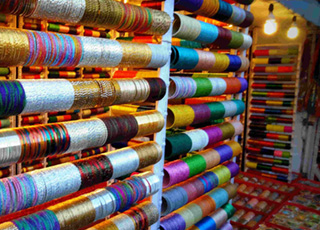Natural Gas price cut to benefit the Ferozabad glass bangle industry?
Updated: Sep 30, 2015 03:02:53pm

The small entrepreneurs have been urging the government to revert to the older system of providing gas at subsidised rates.
As of now, the bangle making units, belonging to the Taj Trapezium Zone (TTZ) are paying for natural gas a certain amount, irrespective of their actual usage. What this means is that both small units and large units are paying the same amount as the total amount is divided equally among all units.
Under the circumstances, the glass bangle units have been asking the government to revert to the older system of providing natural gas at subsidized rates, also known as the administered price mechanism (APM).
According to Supreme Court’s order in 1980’s “no one can use charcoal under the Taj Trapezium zone, instead a gas will be used there which will be available at a subsidised rate”.
The situation further worsened for them after the rise in the price of natural gas last year, which made it difficult for them to survive.
Today, the government cut down the natural gas prices by 16 per cent to USD 4.24 per unit for the six month period, beginning October 1.
The price would be valid for the next six months. The price of domestic natural gas is decided based on a formula approved by Modi-government in October last year, which is linked to global indices.
As per the mechanism approved in October 2014, price of domestically produced natural gas is to be revised every six months using weighted average or rates prevalent in gas-surplus economies of US/Mexico, Canada and Russia to incentivise exploration in deep-sea that wasn’t viable at USD 4.2 rate.
“We have no help in the form of low cost fuel from the government which makes it very difficult for us to operate with high cost of production,” Sanjay Prakash Mittal, owner of Farukhi Glass Industries, told KNN.
Mittal, who is also a member of Uttar Pradesh Glass Manufacturer Syndicate (UPGMS) and Association of Glass Manufacturers in Firozabad, said “the Glass Industry employing thousands of people is on the verge of dying”.
He, however said, that many of their big competitors like Hindustan Glass & Industries (HNGIL), which is one of the largest container glass package solution provider in India and also the only industry operating outside the TTZ has already occupied 55 per cent market share.
He said the company, being bigger in size, is able to manufacture at an optimum cost using Petro Coke in their production which the small scale industries coming under TTZ are not allowed to use.
This makes SME glass manufacturer very difficult to compete with these big competitors, Mittal said.
As many other polluting industries find a mid-way to this problem by shifting their cluster of firms outside the trapezium zone, Mittal said “it is very expensive for glass industries to move out from this zone.”
The industry has been pinning hope on the Government to come out with a mid-way solution that has the power to serve the dual purpose of pollution control and provide low cost fuel to the small bangle units.
TTZ is home to 350 industrial units of which 80 per cent are small scale, using less than 5000 standard cubic metres per day. Over 10 lakh people in Firozabad have been traditionally manufacturing glass bangles for several decades. (KNN/ Zeba)












